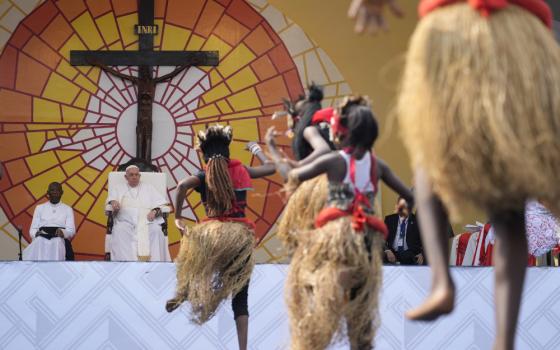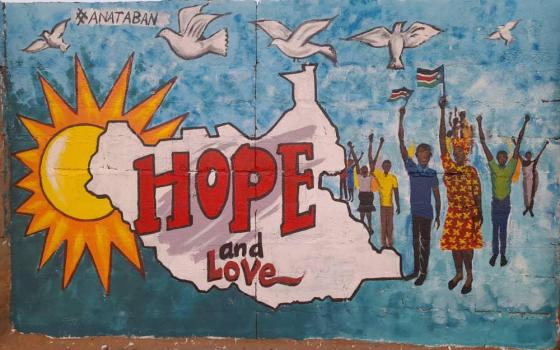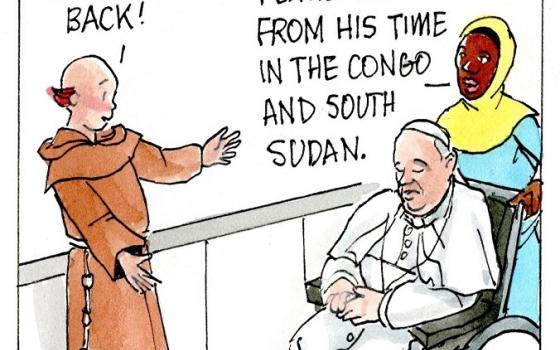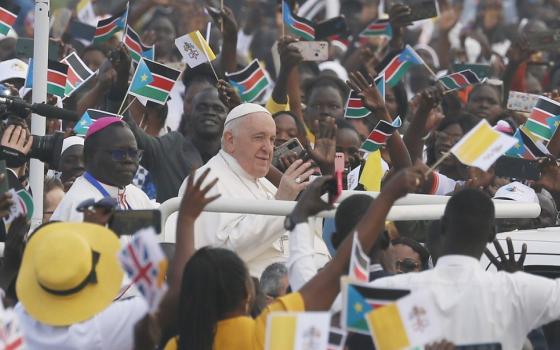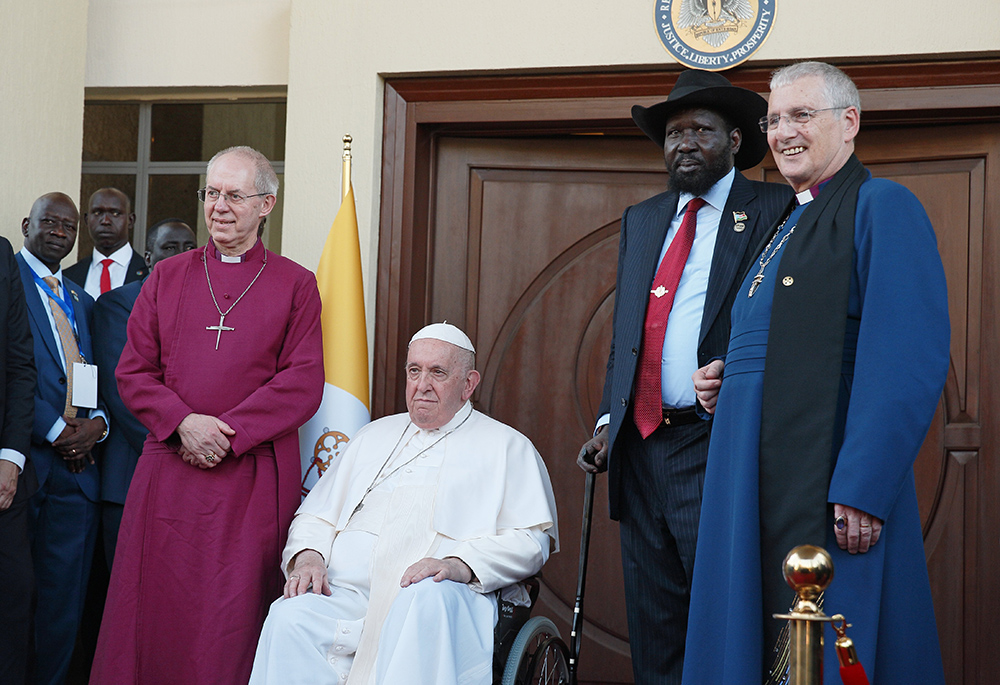
Anglican Archbishop Justin Welby, Pope Francis, President Salva Kiir and the Rev. Iain Greenshields, moderator of the Presbyterian Church of Scotland, are pictured outside the presidential palace after the pope's arrival Feb. 3 in Juba, South Sudan. (CNS/Paul Haring)
Pope Francis, the archbishop of Canterbury and the moderator of the Church of Scotland arrived in South Sudan on Feb. 3 in an historic ecumenical visit, offering a joint and impassioned appeal for peace after a decade of raging civil war in the world's youngest country.
"No more of this!" Francis begged during an arrival ceremony at the presidential palace. "No more bloodshed, no more conflicts, no more violence and mutual recriminations about who is responsible for it, no more leaving your people athirst for peace. No more destruction: it is time to build!"
In 2011, nearly 99% of South Sudanese voted for independence from Sudan. The promises of the young nation were dashed when just two years later, the country was engulfed in a vicious civil war after a rift between its president, Salva Kiir, and his vice president and political rival, Riek Machar.
The civil war left a body count of an estimated 400,000 people, with another 4 million displaced, and left the rest of the country in a state of nearly unparalleled poverty, corruption and insecurity.
"Leave the time of war behind and let a time of peace dawn," Francis pleaded in the presence of Kiir, Machar and the country's other fragile coalition government leaders at the palace.
Prelates watch as Pope Francis arrives at the international airport in Juba, South Sudan, Feb. 3. (CNS/Paul Haring)
During the public ceremony, Kiir announced that his government would resume peace talks with the various parties from South Sudan that had not signed on to the 2018 agreement. In November, he pulled out of peace negotiations that were being facilitated by the Community of Sant'Egidio, a Catholic social service organization based in Rome. The president said he hopes all parties can come back to the table with the hope of building an "inclusive peace" in the country.
When the pope's plane touched down here in the fledgling capital of Juba, following a three-day visit to the Democratic Republic of the Congo, both Welby and Greenshields made their way onto the aircraft for a private greeting with Francis before the pope was taken down to the tarmac via an automated lift.
President Kiir greeted Francis, taking off his signature cowboy hat and walking next to Francis' wheelchair as the two made their way down the red carpet. As they headed toward the palace, a local marching band sounded off with a rousing rendition of the popular hymn "I have decided to follow Jesus."
Thousands of South Sudanese poured onto the new dusty streets of Juba to witness the highest profile event in the country's young history. Despite the scorching heat, many young people turned out wearing their Sunday best, waving tree branches and flags of the Holy See and South Sudan.
The leaders of the three Christian churches have sought, unsuccessfully, for the last five years to visit the war-ravaged nation together, but had been impeded by deteriorating conditions in the country, or more recently, the 86-year-old Francis' mobility issues.
Despite such difficulties, the three churches — representing the three largest religious groups in the overwhelming majority Christian nation — have been actively involved in South Sudan's delicate peace process, including the organization of an historic summit at the Vatican in 2019 with the country's opposition leaders.
As the church leaders began their three-day visit, Francis offered a blunt charge to the warring political leaders, long paralyzed by seemingly intractable tribal and ethnic conflict, urging them to abandon violence and become peacemakers.
"History itself will remember you if you work for the benefit of this people that you have been called to serve," the pope said. "Future generations will either venerate your names or cancel their memory, based on what you do now."
The sons and daughters of South Sudan — where more than 73% of the country's population is under age 30 — "need fathers, not overlords," said Francis. "They need steady steps towards development, not constant collapses."
Without laying down weapons, the pope said, the fertile, promising land of South Sudan will become a cemetery.
Advertisement
While the country's current peace process efforts date to 2005, the turbulent years since have yielded ongoing intercommunal violence and political instability.
The warring ethnic leaders entered into a provisional framework for a peace agreement in 2018, and following the 2019 religious retreat at the Vatican, pledged a ceasefire, outlined internal mechanisms to resolve hostilities and guaranteed that humanitarian organizations would be allowed to work in the country.
Four years later, those promises remain unfulfilled.
The pope acknowledged that the much-anticipated visit by the Christian leaders represented a rare occasion — a first in modern Christendom. In the same manner that the "peace pilgrimage" marked a deepening of ecumenical relations and novelty for the three churches, Francis said the visit could represent "a change of direction" for the country's leaders as well.
Those responsible for governing, said Francis, "have the duty to place themselves at the service of the common good. That is the purpose of power: to serve the community."
"Let each citizen understand that the time has come to stop being carried along by the tainted waters of hatred, tribalism, regionalism and ethnic differences," said the pope. "It is time to sail together towards the future!"
Both Francis and Justin Welby, the archbishop of Canterbury, specifically singled out the need to elevate the country's young people and the role of women in political life and the country's decision-making.
"Women need to be respected, for anyone who commits an act of violence towards a woman commits it towards God, who took flesh from a woman," said the pope.
A 2022 United Nations report detailed a "hellish existence for women and girls" in South Sudan, due to armed perpetrators of widespread rape and violence.
Welby, the head of the global Anglican Communion, told the arrival ceremony that the three Christian leaders had "come to honor the women who have known such terrible suffering and yet have been the sign of the resurrection life."
Moderator of the Church of Scotland Iain Greenshields focused his brief remarks on the example of Jesus, who, as "the Prince of Peace," he said, "Brings justice for all — families, tribes, nations."
A picture of Pope Francis is seen in the crowd as the pope attends a welcoming ceremony at the international airport in Juba, South Sudan, Feb. 3. (CNS/Paul Haring)
As South Sudan has been engulfed in conflict over the last decade, the country's various Christian denominations have been noted for their cooperation in peace efforts.
But in a recent essay from the Vatican's office for Christian Unity published in L'Osservatore Romano, the Vatican's daily newspaper, acknowledged that tribal tensions within the churches had begun to increase recently.
"The pilgrimage of the pope, the Archbishop and the Moderator is therefore an exercise of the Lord's mandate to Peter to 'strengthen your brothers,' '' the Jan. 24 essay said. "That Pope Francis is undertaking this Petrine task jointly with Archbishop Welby and Moderator Greenshields is of enormous ecumenical significance."
In his remarks, Greenshields underscored that point, saying both the country's political and Christian leaders must find a way to work to live out the promises of the prince of peace.
"Today, we need that peace," he said. "We need churches and leaders who are generous of heart, liberal of love, and profligate with God's grace."
"We need leaders who care about the values by which our countries live, who care about the conditions in which people live, and who act out their faith in work amongst the most vulnerable and marginalized," said Greenshields. "These things make for peace."
Over the next three days the three leaders are scheduled to hear firsthand testimonies from victims of the country's war. They are also to lead a joint ecumenical prayer service intended to bring together members of all the country's churches in hopes of greater unity.
As he concluded his opening remarks of what he described as both a pilgrimage of peace and reconciliation, Francis acknowledged that some of his words may have been especially direct.
"Please, know that this arises only from the affection and concern with which I follow the life of your country," he said.





